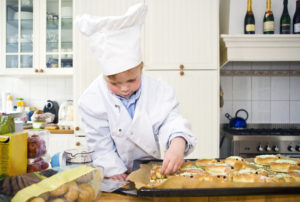
Mark Twain in his adventures of Tom Sawyer tells of Tom playing hooky from school, usually fishing or roaming in the woods. On a beautiful spring or fall day, life in a classroom was disconnected from a young boy’s need to get out and explore, and perhaps do something meaningful, such as catch a fish or rabbit for dinner.
In our new education there exists fluidity between real life and school. Life in school and life outside of school appear similar in many ways, as one merges into the other. Self-directed meaningful activity connects to all aspects of life as mastery is accomplished.
As we prepare environments for meaningful independent mastery for the entire person–body, mind, heart, and spirit–the outdoor flows into the classroom.
Work extends into the garden. The garden highlights the biology and rhythms of life to the child. As the child works outdoors, life connects to all the sciences. This discovery of science allows the child to explore nature, ideas, people and tools.
With this self-selected meaningful work that has deep time to create deep connections; real life resides in every moment.
Real life is not defined as something that happens later–when you go to high school, graduate from college, get a job, get married, have children, retire, and on and on.
Real life in our new education is defined as “right now”.
School, home and work meld into satisfying and creative human experiences as relationships among ideas, people, tools and nature are explored, discovered, and developed with an autonomous spirit of learning and self-discovery.
This fluidity doesn’t mean though that our students can do anything they like. It means that they’ll like what they do as they explore and work on appropriate life-affirming skills in specially prepared environments that offer freedom within limits of responsibility.
The ability to do something freely comes with the idea that when we are called upon to act for the greater good, we will “respond with ability,” i.e. responsibility. In this dynamic process we continually enlarge the limits of our freedoms.
What does this look like for a six-year old?
In our new education, Charlie has been nourished, protected and strengthened from birth by his parents and teachers to make independent choices and complete tasks with concentrated effort.
In his classroom of six-to-nine year olds, Charlie begins one day by choosing to make banana bread for his classmates’ snack. He invites an experienced nine-year-old friend, Priscilla, to help him gather ingredients and prepare the bread.
As Charlie sees his community enjoy the bread at lunch, he is encouraged and motivated to make bread the next day. As he meets with success Charlie explores other recipes and asks to cook at home. When Charlie forgets to add baking powder to a batch of bread, he reflects on his cooking “disaster.” From his failure he becomes curious about the chemistry of cooking and the reactions that must occur for tasty treats.
Charlie’s curiosity about cooking increases, and he asks his teacher if he can “go out” and visit a bakery to see how different baked goods are made. Charlie works with the teacher to contact a local baker and arrange a visit. Charles makes the phone call himself, after the teacher has quietly “prepared” a partnership with the baker for Charlie’s request to visit.
In Charlie’s classroom there is a list of parents who can take students on outings. Charlie makes arrangements for transportation and supervision for his outing. He extends an invitation to Priscilla to join him on this outing. The two spend a couple of hours at the bakery, and the baker is impressed with their interest and understanding of bread making.
Charlie’s successful outing and deep learning experience forms a launch pad for other learning that will follow this basic cycle: discovery, experience through meaningful activity, desire to learn more, exploration of other learning opportunities, and on and on to complete cycle after cycle of personal learning and self-discovery.
In our new education the lines between school and real life are invisible, because in our new education learning is real and personal, emerging from the interests and choices of each individual as he or she engages in self-selected purposeful tasks with time for mastery.
This is part of a series of articles on creating a fresh approach to education.
Next: Service To Humanity


The greatest mistake ever made is to isolate the child from the society of the adult,
as has happened in modern times. ~ Maria Montessori
Teresa,
Amen!